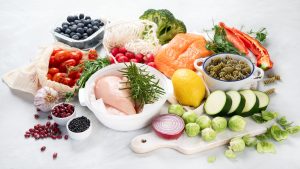
Inflammation is a natural response of the body’s immune system to injury, infection, or harmful stimuli. However, when inflammation becomes chronic, it can lead to a variety of health issues, including heart disease, diabetes, and autoimmune disorders. Understanding the warning signs of inflammation, knowing which foods to avoid, and incorporating anti-inflammatory foods into your diet can help manage and reduce inflammation effectively.
Warning Signs of Inflammation
Inflammation can manifest in various ways, and its symptoms can be either acute or chronic. Here are some common warning signs:
- Redness and Swelling: Acute inflammation often results in redness and swelling in the affected area, as the body sends white blood cells to the site of injury or infection.
- Pain and Heat: The inflamed area might feel warm to the touch and painful, indicating that the body is working to heal itself.
- Fatigue and Fever: Chronic inflammation can cause persistent fatigue and low-grade fever as the body continuously fights off perceived threats.
- Joint Pain: Conditions like arthritis are examples of chronic inflammation that specifically affects the joints, causing pain and stiffness.
- Digestive Issues: Inflammatory bowel diseases such as Crohn’s disease and ulcerative colitis cause chronic inflammation in the digestive tract, leading to symptoms like abdominal pain, diarrhea, and bloating.
- Skin Problems: Chronic inflammation can manifest as skin conditions like eczema, psoriasis, or acne.
- Mental Health Changes: Research suggests that chronic inflammation may contribute to mental health issues such as depression and anxiety.
Foods to Avoid
Certain foods can exacerbate inflammation and should be limited or avoided to manage inflammation effectively. These include:
- Sugary Foods and Beverages: High sugar intake can trigger the release of inflammatory markers. Avoid sodas, sweets, and processed foods high in sugar.
- Refined Carbohydrates: Foods like white bread, pastries, and white rice have a high glycemic index, leading to spikes in blood sugar and increased inflammation.
- Fried Foods: Foods fried in unhealthy oils contain trans fats, which are known to promote inflammation.
- Processed Meats: Meats like sausages, bacon, and deli meats contain preservatives and additives that can trigger inflammatory responses.
- Excessive Alcohol: High alcohol consumption can lead to inflammation of the liver and other organs.
- Artificial Additives: Preservatives, artificial sweeteners, and other additives found in many processed foods can contribute to inflammation.
- Saturated Fats: High intake of saturated fats found in red meat, cheese, and other animal products can increase inflammation.
Foods to Help Reduce Inflammation
Incorporating anti-inflammatory foods into your diet can help manage and reduce inflammation. These foods are rich in antioxidants, healthy fats, and other nutrients that support the body’s natural defense mechanisms.
- Fruits and Vegetables: Colorful fruits and vegetables like berries, leafy greens, tomatoes, and bell peppers are high in antioxidants and vitamins.
- Fatty Fish: Fish such as salmon, mackerel, and sardines are rich in omega-3 fatty acids, which have potent anti-inflammatory effects.
- Nuts and Seeds: Almonds, walnuts, flaxseeds, and chia seeds provide healthy fats and antioxidants.
- Olive Oil: Extra virgin olive oil contains oleocanthal, a compound with anti-inflammatory properties.
- Whole Grains: Foods like brown rice, quinoa, and oats provide fiber and nutrients that can help reduce inflammation.
- Spices: Turmeric, ginger, and garlic are known for their anti-inflammatory and antioxidant properties.
- Green Tea: Rich in antioxidants, green tea can help reduce inflammation and provide numerous other health benefits.
Anti-Inflammatory Recipes
Recipe 1: Turmeric and Ginger Lentil Soup
Ingredients:
- 1 cup red lentils, rinsed
- 1 tablespoon olive oil
- 1 onion, diced
- 2 carrots, diced
- 2 celery stalks, diced
- 3 garlic cloves, minced
- 1-inch piece of ginger, grated
- 1 teaspoon turmeric powder
- 1 teaspoon cumin
- 4 cups vegetable broth
- 1 can (14 oz) diced tomatoes
- 1 cup spinach leaves, chopped
- Salt and pepper to taste
- Lemon wedges for serving
Instructions:
- Heat the olive oil in a large pot over medium heat. Add the onion, carrots, and celery, and sauté until softened, about 5 minutes.
- Add the garlic, ginger, turmeric, and cumin. Cook for another 1-2 minutes until fragrant.
- Stir in the lentils, vegetable broth, and diced tomatoes. Bring to a boil, then reduce heat and simmer for 20-25 minutes, or until the lentils are tender.
- Stir in the spinach and cook for another 2-3 minutes until wilted.
- Season with salt and pepper to taste.
- Serve hot, with lemon wedges on the side for added flavor.
Recipe 2: Salmon and Avocado Salad
Ingredients:
- 2 salmon fillets
- 1 tablespoon olive oil
- Salt and pepper to taste
- 4 cups mixed greens (spinach, arugula, kale)
- 1 avocado, sliced
- 1 cup cherry tomatoes, halved
- 1 cucumber, sliced
- ¼ red onion, thinly sliced
- ¼ cup walnuts, chopped
- 2 tablespoons balsamic vinegar
- 1 tablespoon lemon juice
- 1 teaspoon Dijon mustard
Instructions:
- Preheat the oven to 400°F (200°C). Place the salmon fillets on a baking sheet, drizzle with olive oil, and season with salt and pepper.
- Bake the salmon for 12-15 minutes, or until cooked through and flaky.
- While the salmon is baking, prepare the salad. In a large bowl, combine the mixed greens, avocado, cherry tomatoes, cucumber, red onion, and walnuts.
- In a small bowl, whisk together the balsamic vinegar, lemon juice, and Dijon mustard to make the dressing.
- Once the salmon is done, let it cool slightly before flaking it into large pieces.
- Add the salmon to the salad and drizzle with the dressing. Toss gently to combine.
- Serve immediately.
Conclusion
Inflammation is a crucial part of the body’s immune response, but chronic inflammation can lead to serious health problems. Recognizing the warning signs and making dietary changes are essential steps in managing inflammation. Avoiding foods that promote inflammation and incorporating anti-inflammatory foods can significantly improve your overall health.
Disclaimer: Remember, when in doubt, always consult your doctor with questions you may have about your health and diet.
